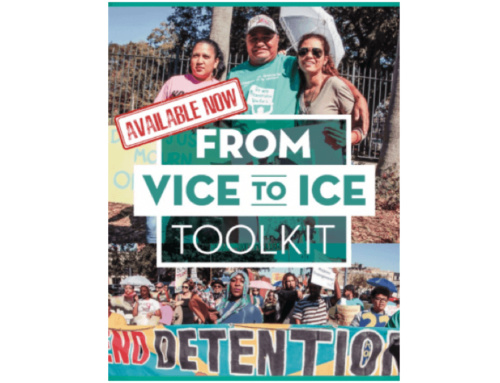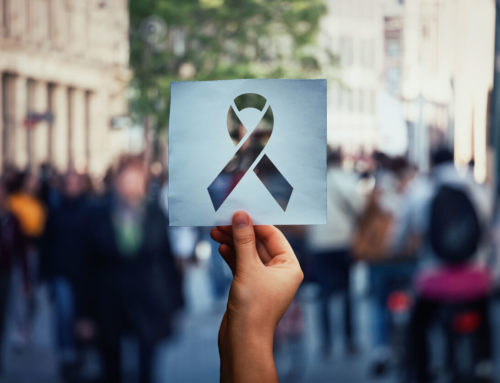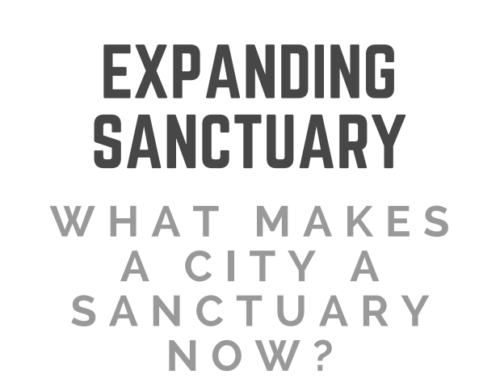Post by Tia Oso, National Coordinator for the Black Immigration Network and BAJI Arizona Organizer
Late Monday, in a much anticipated decision, Arizona Governor Doug Ducey vetoed Senate Bill 1445, dubbed the “Secret Police” bill. As the Movement for Black Lives shines the light of justice on the crisis of police brutality plaguing Black communities across the country, powerful Arizona police unions used their influence to introduce SB1445. The bill withheld the identity of officers that used deadly force or police brutality for 60 days, as well as redacting officer’s names from their disciplinary records. BAJI played a key role in building a multiracial coalition of organizations and community leaders that successfully opposed the legislation through a people centered strategy. This coalition organized thousands to voice their opposition, ultimately urging Governor Ducey to veto the legislation. While we celebrate this triumphant effort, it is just as important to stay aware of maneuvers to impede progress as we fight to bend the arc of history towards justice, and seek more opportunities to build power.
The crafters of this very dangerous measure described the mandatory hold as a cooling off period and common sense step to protect officers against the “court of public opinion”. Their divisive rhetoric ignored the reality of communities plagued by state violence at the hands police, at current count 14 deaths in Arizona alone during the first 12 weeks of 2015. The measure also did nothing to address the media vilification of victims of police violence, which can be just as incendiary to public tensions. Instead, lawmakers characterized hurting families and passionate protestors as “angry mobs”,”lunatics” and “political zealots” on a mythical rampage to terrorize police and their families. This narrative worked to distract from the fact that SB1445 is a fascist, draconian piece of legislation that would have further solidified the collusion of power which allows police to abuse and kill with impunity from the state. It is telling that the letter accompanying the Governor’s veto reflected the tone of the police , citing other law enforcement officials, the Police Chiefs Association, as the primary reason for the veto, not community concerns. Also, cited was the deeply disturbing subsection (B) which would have redacted officer’s names from records of disciplinary action. This would have allowed discriminatory, abusive individuals to hide, making it even harder to hold officers accountable and seek civil or legal recourse. Preemptive measures such as SB1445 are a critical sign that our movement has traction and is making important progress. We must continue to address these important opportunities for intervention, and challenge ourselves to seek more ways we can work together and commit to transformational solidarity.
While the Movement for Black Lives has succeeded in raising issues of abusive police in Black communities to the national consciousness, often unexamined is the crisis of state violence in other areas. Such as people killed by border patrol agents across the U.S./Mexico border. Same for the violence and abuse committed daily against those that are incarcerated and detained. Violence against trans people goes largely dismissed as routine, whether perpetrated by the state or private citizens. We must commit to connecting struggles and challenging the beliefs that may keep us working in isolation.
Arizona is a testing ground for conservative legislation that targets and harms communities of color and sets precedent for other states to follow suit, as seen with SB1070. These attempts to roll back transparency and public accountability of law enforcement come at a time when it is needed most. The resistance of determined and organized people is resulting in important progress such as the successful prosecution of Maricopa County Sheriff Joe Arpaiao for racial profiling, and the scathing Department of Justice report on the police practices in Ferguson, MO. The victory against SB1445 is an example of what is possible when movements unite for a common purpose. As we affirm victory in a crucial battle, we must keep our eyes on the prize and continue to build and grow a movement that is inclusive, principled and ever focused on securing liberty by building multiracial alliances to advance a democracy that works for us all.
Read the original post on BAJI’s website.



